Teaching Resources and Learning Experiences: A Comprehensive Report
VerifiedAdded on 2023/01/06
|8
|2055
|38
Report
AI Summary
This report delves into the analysis of teaching resources and learning experiences, focusing on the theoretical perspectives influencing student learning, particularly for children aged 5-8. It explores intentional teaching proposals for literacy and mathematics, emphasizing the use of music, nature, and gaming to enhance engagement and understanding. The report outlines specific plans for both literacy and math curricula, detailing teaching strategies like cooperative learning, visualization, and group activities. Furthermore, it evaluates these strategies within the framework of the Victorian Early Years Learning and Development Framework (VEYLDF), highlighting the importance of student well-being and a strong sense of identity. The conclusion summarizes the key findings, emphasizing the impact of intentional teaching and its alignment with VEYLDF principles.
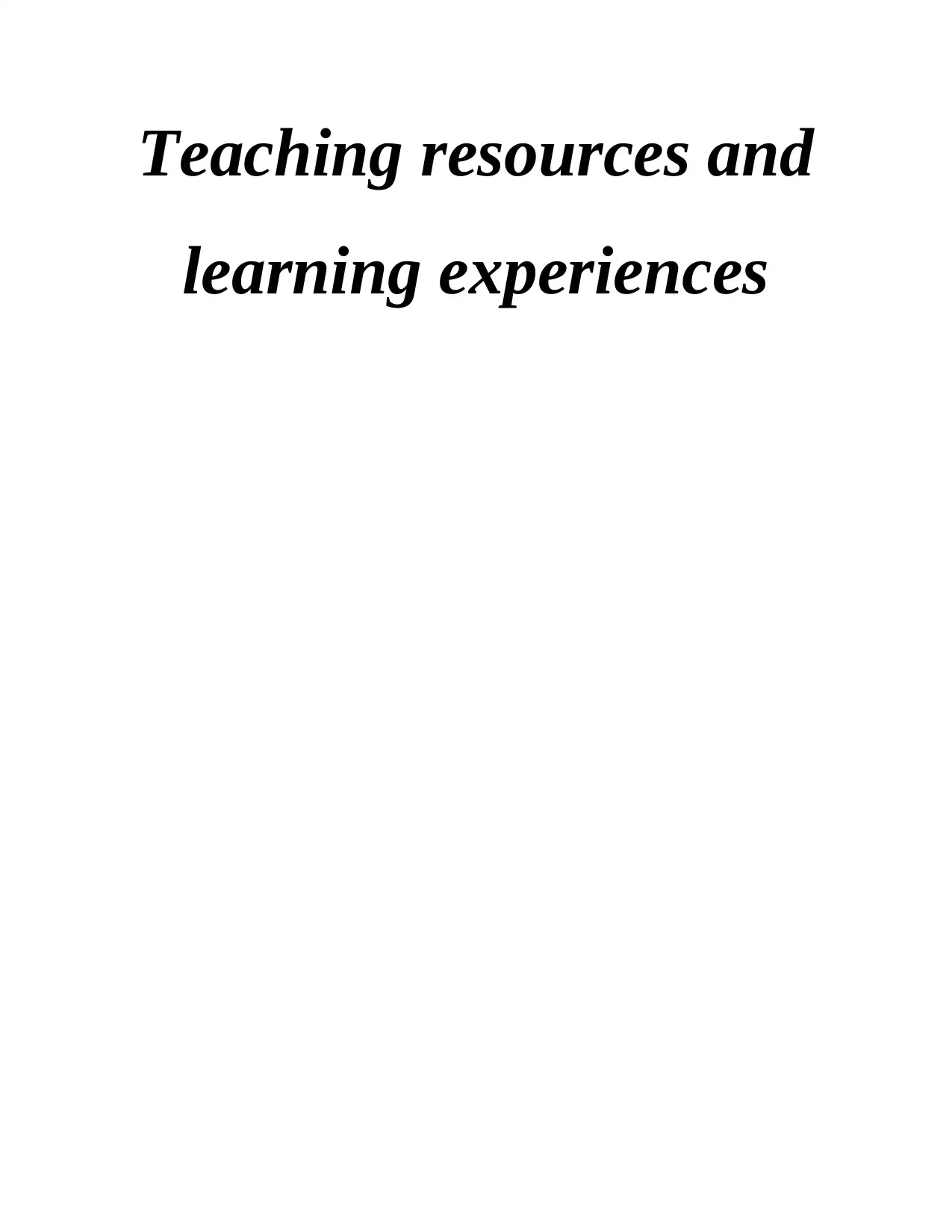
Teaching resources and
learning experiences
learning experiences
Paraphrase This Document
Need a fresh take? Get an instant paraphrase of this document with our AI Paraphraser
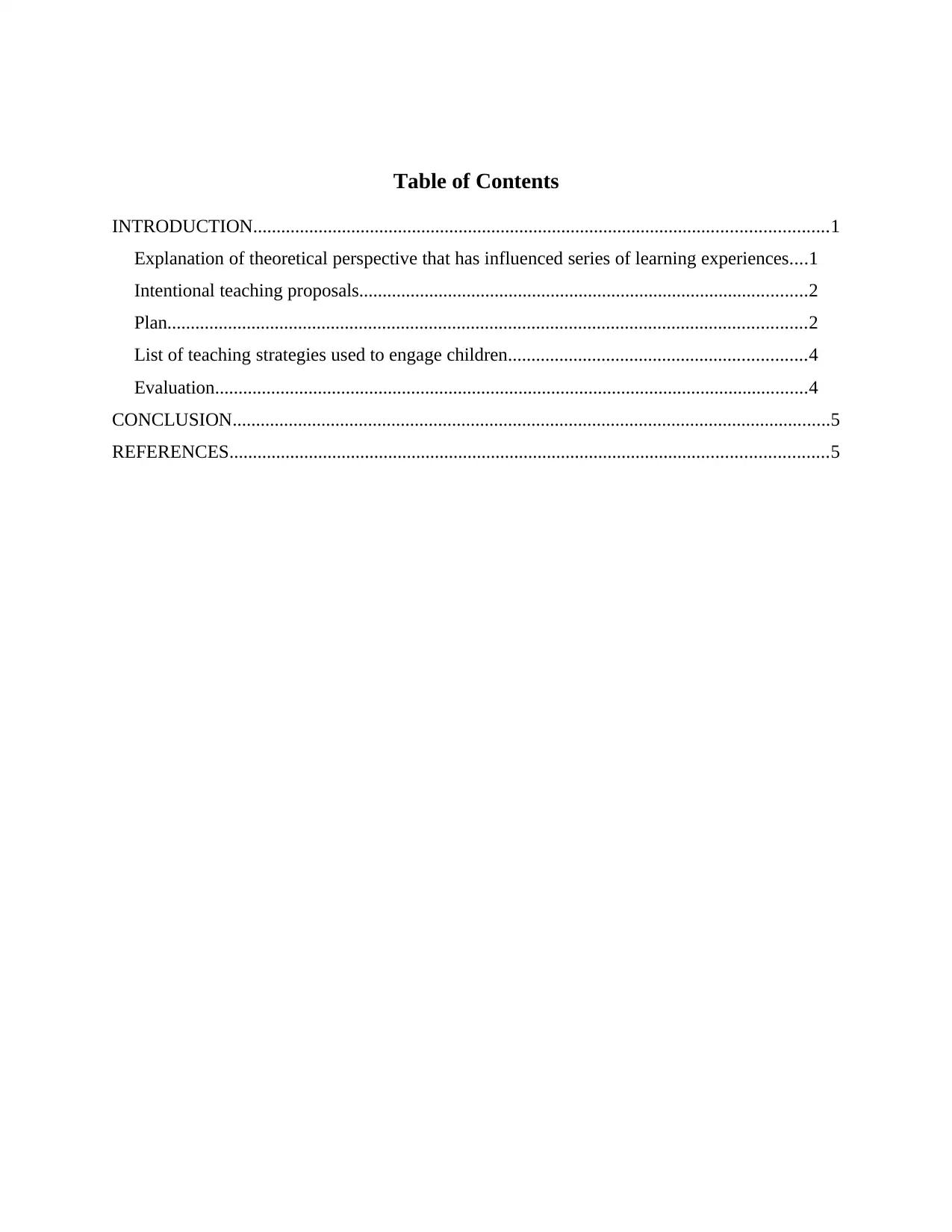
Table of Contents
INTRODUCTION...........................................................................................................................1
Explanation of theoretical perspective that has influenced series of learning experiences....1
Intentional teaching proposals................................................................................................2
Plan.........................................................................................................................................2
List of teaching strategies used to engage children................................................................4
Evaluation...............................................................................................................................4
CONCLUSION................................................................................................................................5
REFERENCES................................................................................................................................5
INTRODUCTION...........................................................................................................................1
Explanation of theoretical perspective that has influenced series of learning experiences....1
Intentional teaching proposals................................................................................................2
Plan.........................................................................................................................................2
List of teaching strategies used to engage children................................................................4
Evaluation...............................................................................................................................4
CONCLUSION................................................................................................................................5
REFERENCES................................................................................................................................5
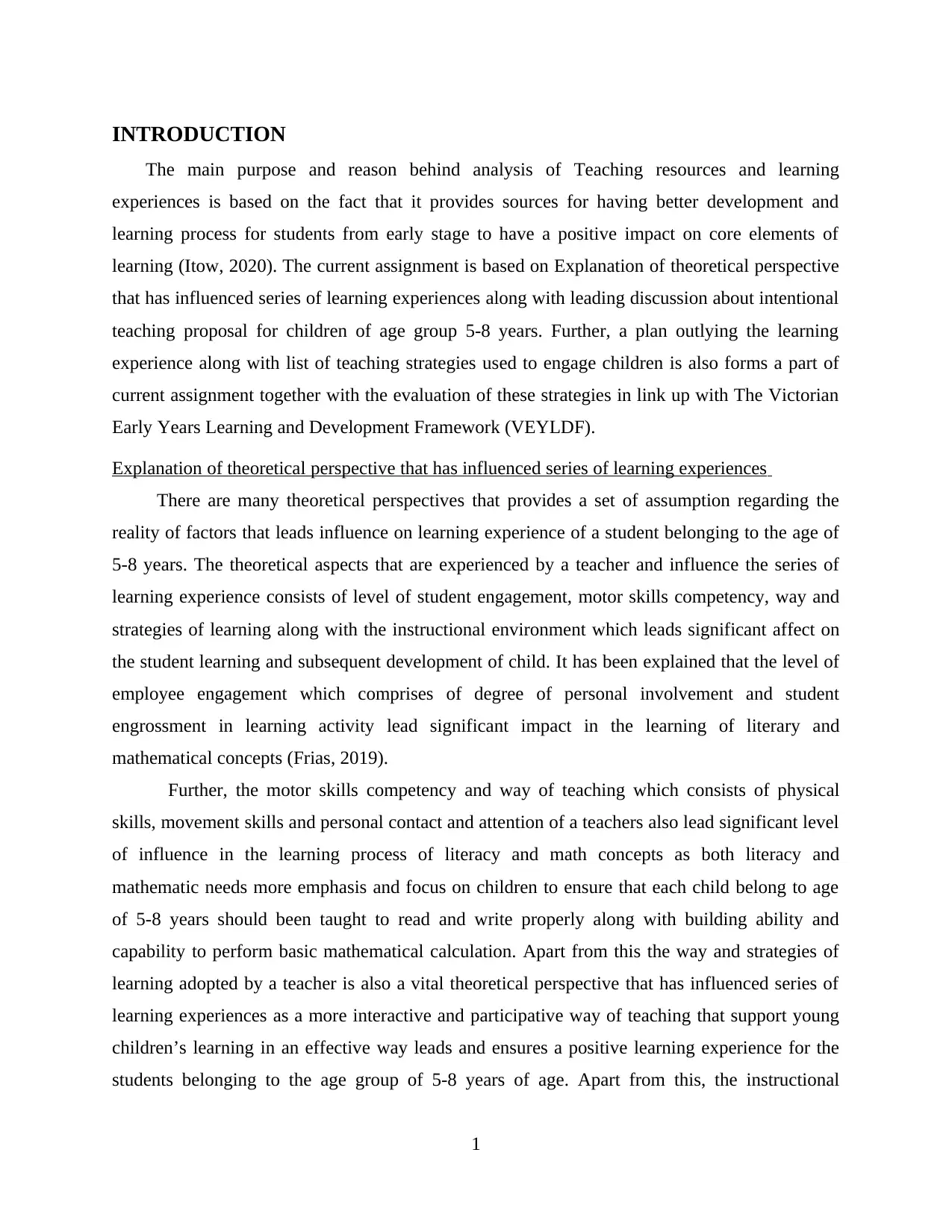
INTRODUCTION
The main purpose and reason behind analysis of Teaching resources and learning
experiences is based on the fact that it provides sources for having better development and
learning process for students from early stage to have a positive impact on core elements of
learning (Itow, 2020). The current assignment is based on Explanation of theoretical perspective
that has influenced series of learning experiences along with leading discussion about intentional
teaching proposal for children of age group 5-8 years. Further, a plan outlying the learning
experience along with list of teaching strategies used to engage children is also forms a part of
current assignment together with the evaluation of these strategies in link up with The Victorian
Early Years Learning and Development Framework (VEYLDF).
Explanation of theoretical perspective that has influenced series of learning experiences
There are many theoretical perspectives that provides a set of assumption regarding the
reality of factors that leads influence on learning experience of a student belonging to the age of
5-8 years. The theoretical aspects that are experienced by a teacher and influence the series of
learning experience consists of level of student engagement, motor skills competency, way and
strategies of learning along with the instructional environment which leads significant affect on
the student learning and subsequent development of child. It has been explained that the level of
employee engagement which comprises of degree of personal involvement and student
engrossment in learning activity lead significant impact in the learning of literary and
mathematical concepts (Frias, 2019).
Further, the motor skills competency and way of teaching which consists of physical
skills, movement skills and personal contact and attention of a teachers also lead significant level
of influence in the learning process of literacy and math concepts as both literacy and
mathematic needs more emphasis and focus on children to ensure that each child belong to age
of 5-8 years should been taught to read and write properly along with building ability and
capability to perform basic mathematical calculation. Apart from this the way and strategies of
learning adopted by a teacher is also a vital theoretical perspective that has influenced series of
learning experiences as a more interactive and participative way of teaching that support young
children’s learning in an effective way leads and ensures a positive learning experience for the
students belonging to the age group of 5-8 years of age. Apart from this, the instructional
1
The main purpose and reason behind analysis of Teaching resources and learning
experiences is based on the fact that it provides sources for having better development and
learning process for students from early stage to have a positive impact on core elements of
learning (Itow, 2020). The current assignment is based on Explanation of theoretical perspective
that has influenced series of learning experiences along with leading discussion about intentional
teaching proposal for children of age group 5-8 years. Further, a plan outlying the learning
experience along with list of teaching strategies used to engage children is also forms a part of
current assignment together with the evaluation of these strategies in link up with The Victorian
Early Years Learning and Development Framework (VEYLDF).
Explanation of theoretical perspective that has influenced series of learning experiences
There are many theoretical perspectives that provides a set of assumption regarding the
reality of factors that leads influence on learning experience of a student belonging to the age of
5-8 years. The theoretical aspects that are experienced by a teacher and influence the series of
learning experience consists of level of student engagement, motor skills competency, way and
strategies of learning along with the instructional environment which leads significant affect on
the student learning and subsequent development of child. It has been explained that the level of
employee engagement which comprises of degree of personal involvement and student
engrossment in learning activity lead significant impact in the learning of literary and
mathematical concepts (Frias, 2019).
Further, the motor skills competency and way of teaching which consists of physical
skills, movement skills and personal contact and attention of a teachers also lead significant level
of influence in the learning process of literacy and math concepts as both literacy and
mathematic needs more emphasis and focus on children to ensure that each child belong to age
of 5-8 years should been taught to read and write properly along with building ability and
capability to perform basic mathematical calculation. Apart from this the way and strategies of
learning adopted by a teacher is also a vital theoretical perspective that has influenced series of
learning experiences as a more interactive and participative way of teaching that support young
children’s learning in an effective way leads and ensures a positive learning experience for the
students belonging to the age group of 5-8 years of age. Apart from this, the instructional
1
⊘ This is a preview!⊘
Do you want full access?
Subscribe today to unlock all pages.

Trusted by 1+ million students worldwide
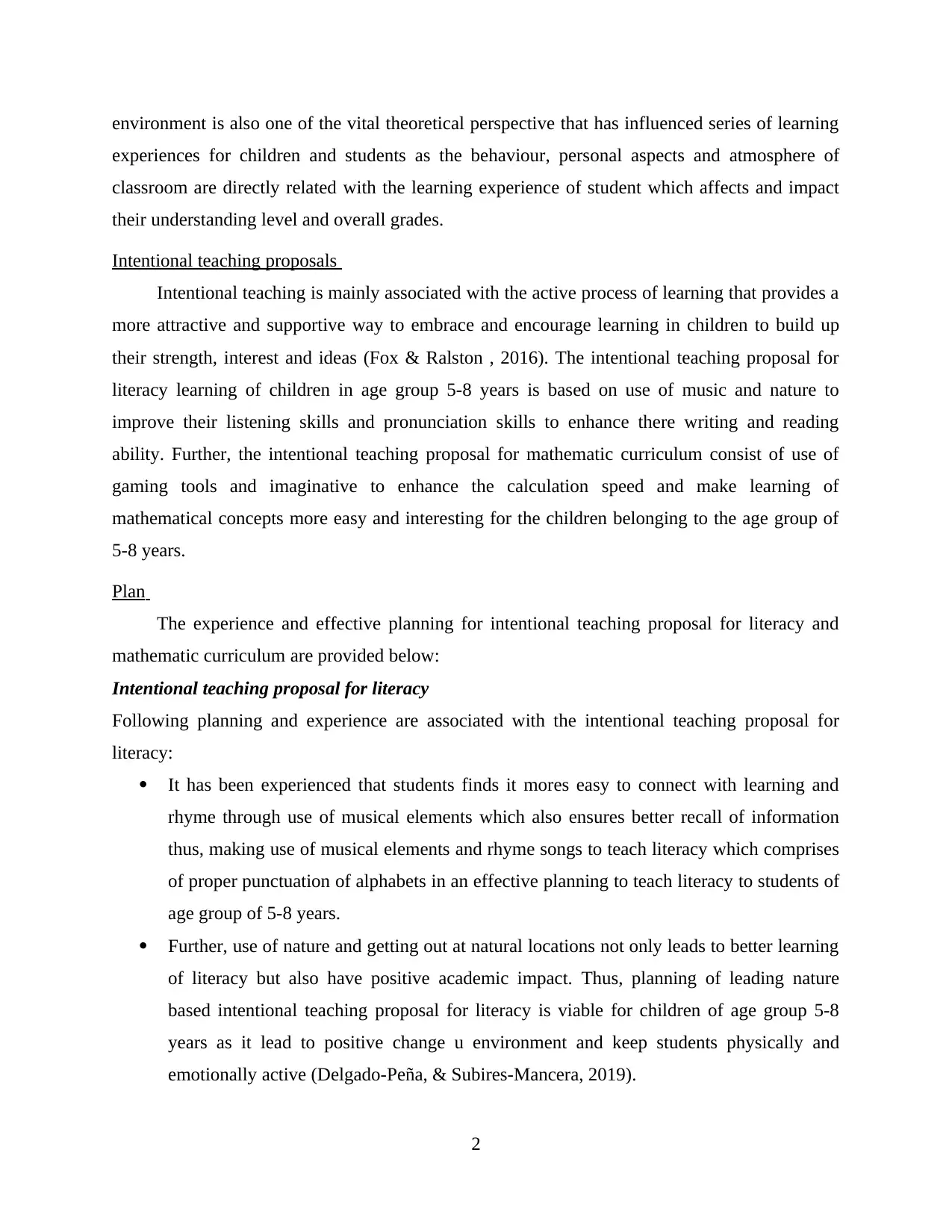
environment is also one of the vital theoretical perspective that has influenced series of learning
experiences for children and students as the behaviour, personal aspects and atmosphere of
classroom are directly related with the learning experience of student which affects and impact
their understanding level and overall grades.
Intentional teaching proposals
Intentional teaching is mainly associated with the active process of learning that provides a
more attractive and supportive way to embrace and encourage learning in children to build up
their strength, interest and ideas (Fox & Ralston , 2016). The intentional teaching proposal for
literacy learning of children in age group 5-8 years is based on use of music and nature to
improve their listening skills and pronunciation skills to enhance there writing and reading
ability. Further, the intentional teaching proposal for mathematic curriculum consist of use of
gaming tools and imaginative to enhance the calculation speed and make learning of
mathematical concepts more easy and interesting for the children belonging to the age group of
5-8 years.
Plan
The experience and effective planning for intentional teaching proposal for literacy and
mathematic curriculum are provided below:
Intentional teaching proposal for literacy
Following planning and experience are associated with the intentional teaching proposal for
literacy:
It has been experienced that students finds it mores easy to connect with learning and
rhyme through use of musical elements which also ensures better recall of information
thus, making use of musical elements and rhyme songs to teach literacy which comprises
of proper punctuation of alphabets in an effective planning to teach literacy to students of
age group of 5-8 years.
Further, use of nature and getting out at natural locations not only leads to better learning
of literacy but also have positive academic impact. Thus, planning of leading nature
based intentional teaching proposal for literacy is viable for children of age group 5-8
years as it lead to positive change u environment and keep students physically and
emotionally active (Delgado-Peña, & Subires-Mancera, 2019).
2
experiences for children and students as the behaviour, personal aspects and atmosphere of
classroom are directly related with the learning experience of student which affects and impact
their understanding level and overall grades.
Intentional teaching proposals
Intentional teaching is mainly associated with the active process of learning that provides a
more attractive and supportive way to embrace and encourage learning in children to build up
their strength, interest and ideas (Fox & Ralston , 2016). The intentional teaching proposal for
literacy learning of children in age group 5-8 years is based on use of music and nature to
improve their listening skills and pronunciation skills to enhance there writing and reading
ability. Further, the intentional teaching proposal for mathematic curriculum consist of use of
gaming tools and imaginative to enhance the calculation speed and make learning of
mathematical concepts more easy and interesting for the children belonging to the age group of
5-8 years.
Plan
The experience and effective planning for intentional teaching proposal for literacy and
mathematic curriculum are provided below:
Intentional teaching proposal for literacy
Following planning and experience are associated with the intentional teaching proposal for
literacy:
It has been experienced that students finds it mores easy to connect with learning and
rhyme through use of musical elements which also ensures better recall of information
thus, making use of musical elements and rhyme songs to teach literacy which comprises
of proper punctuation of alphabets in an effective planning to teach literacy to students of
age group of 5-8 years.
Further, use of nature and getting out at natural locations not only leads to better learning
of literacy but also have positive academic impact. Thus, planning of leading nature
based intentional teaching proposal for literacy is viable for children of age group 5-8
years as it lead to positive change u environment and keep students physically and
emotionally active (Delgado-Peña, & Subires-Mancera, 2019).
2
Paraphrase This Document
Need a fresh take? Get an instant paraphrase of this document with our AI Paraphraser
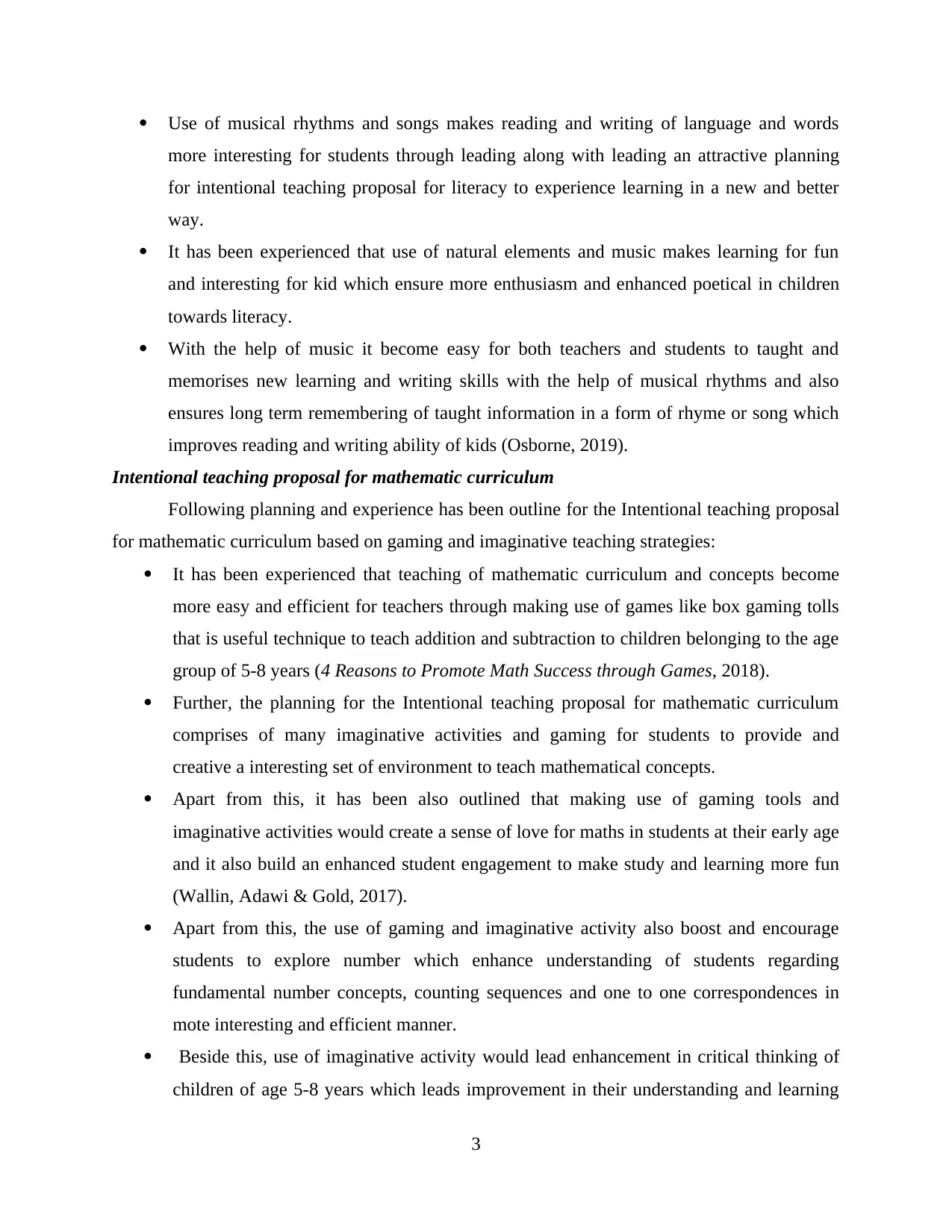
Use of musical rhythms and songs makes reading and writing of language and words
more interesting for students through leading along with leading an attractive planning
for intentional teaching proposal for literacy to experience learning in a new and better
way.
It has been experienced that use of natural elements and music makes learning for fun
and interesting for kid which ensure more enthusiasm and enhanced poetical in children
towards literacy.
With the help of music it become easy for both teachers and students to taught and
memorises new learning and writing skills with the help of musical rhythms and also
ensures long term remembering of taught information in a form of rhyme or song which
improves reading and writing ability of kids (Osborne, 2019).
Intentional teaching proposal for mathematic curriculum
Following planning and experience has been outline for the Intentional teaching proposal
for mathematic curriculum based on gaming and imaginative teaching strategies:
It has been experienced that teaching of mathematic curriculum and concepts become
more easy and efficient for teachers through making use of games like box gaming tolls
that is useful technique to teach addition and subtraction to children belonging to the age
group of 5-8 years (4 Reasons to Promote Math Success through Games, 2018).
Further, the planning for the Intentional teaching proposal for mathematic curriculum
comprises of many imaginative activities and gaming for students to provide and
creative a interesting set of environment to teach mathematical concepts.
Apart from this, it has been also outlined that making use of gaming tools and
imaginative activities would create a sense of love for maths in students at their early age
and it also build an enhanced student engagement to make study and learning more fun
(Wallin, Adawi & Gold, 2017).
Apart from this, the use of gaming and imaginative activity also boost and encourage
students to explore number which enhance understanding of students regarding
fundamental number concepts, counting sequences and one to one correspondences in
mote interesting and efficient manner.
Beside this, use of imaginative activity would lead enhancement in critical thinking of
children of age 5-8 years which leads improvement in their understanding and learning
3
more interesting for students through leading along with leading an attractive planning
for intentional teaching proposal for literacy to experience learning in a new and better
way.
It has been experienced that use of natural elements and music makes learning for fun
and interesting for kid which ensure more enthusiasm and enhanced poetical in children
towards literacy.
With the help of music it become easy for both teachers and students to taught and
memorises new learning and writing skills with the help of musical rhythms and also
ensures long term remembering of taught information in a form of rhyme or song which
improves reading and writing ability of kids (Osborne, 2019).
Intentional teaching proposal for mathematic curriculum
Following planning and experience has been outline for the Intentional teaching proposal
for mathematic curriculum based on gaming and imaginative teaching strategies:
It has been experienced that teaching of mathematic curriculum and concepts become
more easy and efficient for teachers through making use of games like box gaming tolls
that is useful technique to teach addition and subtraction to children belonging to the age
group of 5-8 years (4 Reasons to Promote Math Success through Games, 2018).
Further, the planning for the Intentional teaching proposal for mathematic curriculum
comprises of many imaginative activities and gaming for students to provide and
creative a interesting set of environment to teach mathematical concepts.
Apart from this, it has been also outlined that making use of gaming tools and
imaginative activities would create a sense of love for maths in students at their early age
and it also build an enhanced student engagement to make study and learning more fun
(Wallin, Adawi & Gold, 2017).
Apart from this, the use of gaming and imaginative activity also boost and encourage
students to explore number which enhance understanding of students regarding
fundamental number concepts, counting sequences and one to one correspondences in
mote interesting and efficient manner.
Beside this, use of imaginative activity would lead enhancement in critical thinking of
children of age 5-8 years which leads improvement in their understanding and learning
3
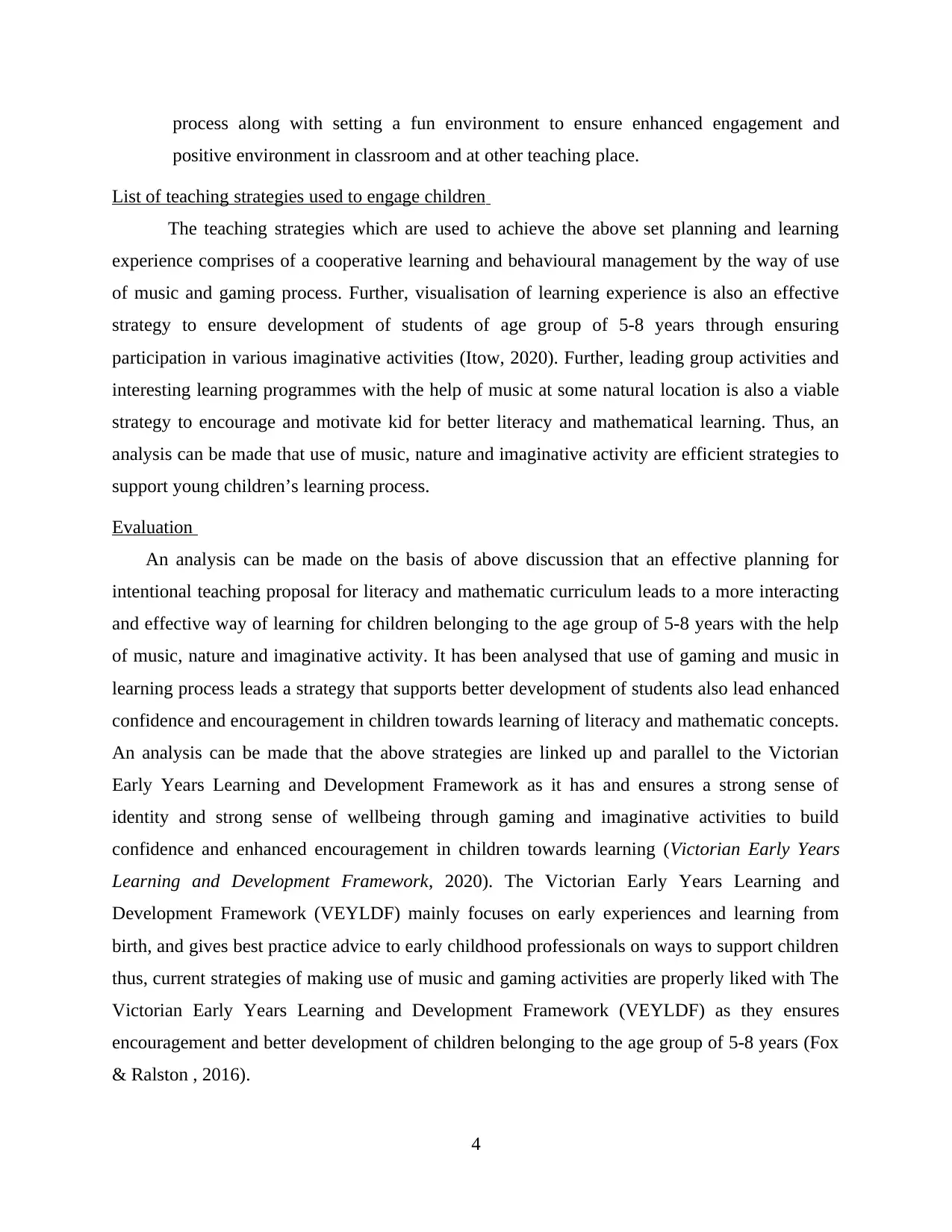
process along with setting a fun environment to ensure enhanced engagement and
positive environment in classroom and at other teaching place.
List of teaching strategies used to engage children
The teaching strategies which are used to achieve the above set planning and learning
experience comprises of a cooperative learning and behavioural management by the way of use
of music and gaming process. Further, visualisation of learning experience is also an effective
strategy to ensure development of students of age group of 5-8 years through ensuring
participation in various imaginative activities (Itow, 2020). Further, leading group activities and
interesting learning programmes with the help of music at some natural location is also a viable
strategy to encourage and motivate kid for better literacy and mathematical learning. Thus, an
analysis can be made that use of music, nature and imaginative activity are efficient strategies to
support young children’s learning process.
Evaluation
An analysis can be made on the basis of above discussion that an effective planning for
intentional teaching proposal for literacy and mathematic curriculum leads to a more interacting
and effective way of learning for children belonging to the age group of 5-8 years with the help
of music, nature and imaginative activity. It has been analysed that use of gaming and music in
learning process leads a strategy that supports better development of students also lead enhanced
confidence and encouragement in children towards learning of literacy and mathematic concepts.
An analysis can be made that the above strategies are linked up and parallel to the Victorian
Early Years Learning and Development Framework as it has and ensures a strong sense of
identity and strong sense of wellbeing through gaming and imaginative activities to build
confidence and enhanced encouragement in children towards learning (Victorian Early Years
Learning and Development Framework, 2020). The Victorian Early Years Learning and
Development Framework (VEYLDF) mainly focuses on early experiences and learning from
birth, and gives best practice advice to early childhood professionals on ways to support children
thus, current strategies of making use of music and gaming activities are properly liked with The
Victorian Early Years Learning and Development Framework (VEYLDF) as they ensures
encouragement and better development of children belonging to the age group of 5-8 years (Fox
& Ralston , 2016).
4
positive environment in classroom and at other teaching place.
List of teaching strategies used to engage children
The teaching strategies which are used to achieve the above set planning and learning
experience comprises of a cooperative learning and behavioural management by the way of use
of music and gaming process. Further, visualisation of learning experience is also an effective
strategy to ensure development of students of age group of 5-8 years through ensuring
participation in various imaginative activities (Itow, 2020). Further, leading group activities and
interesting learning programmes with the help of music at some natural location is also a viable
strategy to encourage and motivate kid for better literacy and mathematical learning. Thus, an
analysis can be made that use of music, nature and imaginative activity are efficient strategies to
support young children’s learning process.
Evaluation
An analysis can be made on the basis of above discussion that an effective planning for
intentional teaching proposal for literacy and mathematic curriculum leads to a more interacting
and effective way of learning for children belonging to the age group of 5-8 years with the help
of music, nature and imaginative activity. It has been analysed that use of gaming and music in
learning process leads a strategy that supports better development of students also lead enhanced
confidence and encouragement in children towards learning of literacy and mathematic concepts.
An analysis can be made that the above strategies are linked up and parallel to the Victorian
Early Years Learning and Development Framework as it has and ensures a strong sense of
identity and strong sense of wellbeing through gaming and imaginative activities to build
confidence and enhanced encouragement in children towards learning (Victorian Early Years
Learning and Development Framework, 2020). The Victorian Early Years Learning and
Development Framework (VEYLDF) mainly focuses on early experiences and learning from
birth, and gives best practice advice to early childhood professionals on ways to support children
thus, current strategies of making use of music and gaming activities are properly liked with The
Victorian Early Years Learning and Development Framework (VEYLDF) as they ensures
encouragement and better development of children belonging to the age group of 5-8 years (Fox
& Ralston , 2016).
4
⊘ This is a preview!⊘
Do you want full access?
Subscribe today to unlock all pages.

Trusted by 1+ million students worldwide
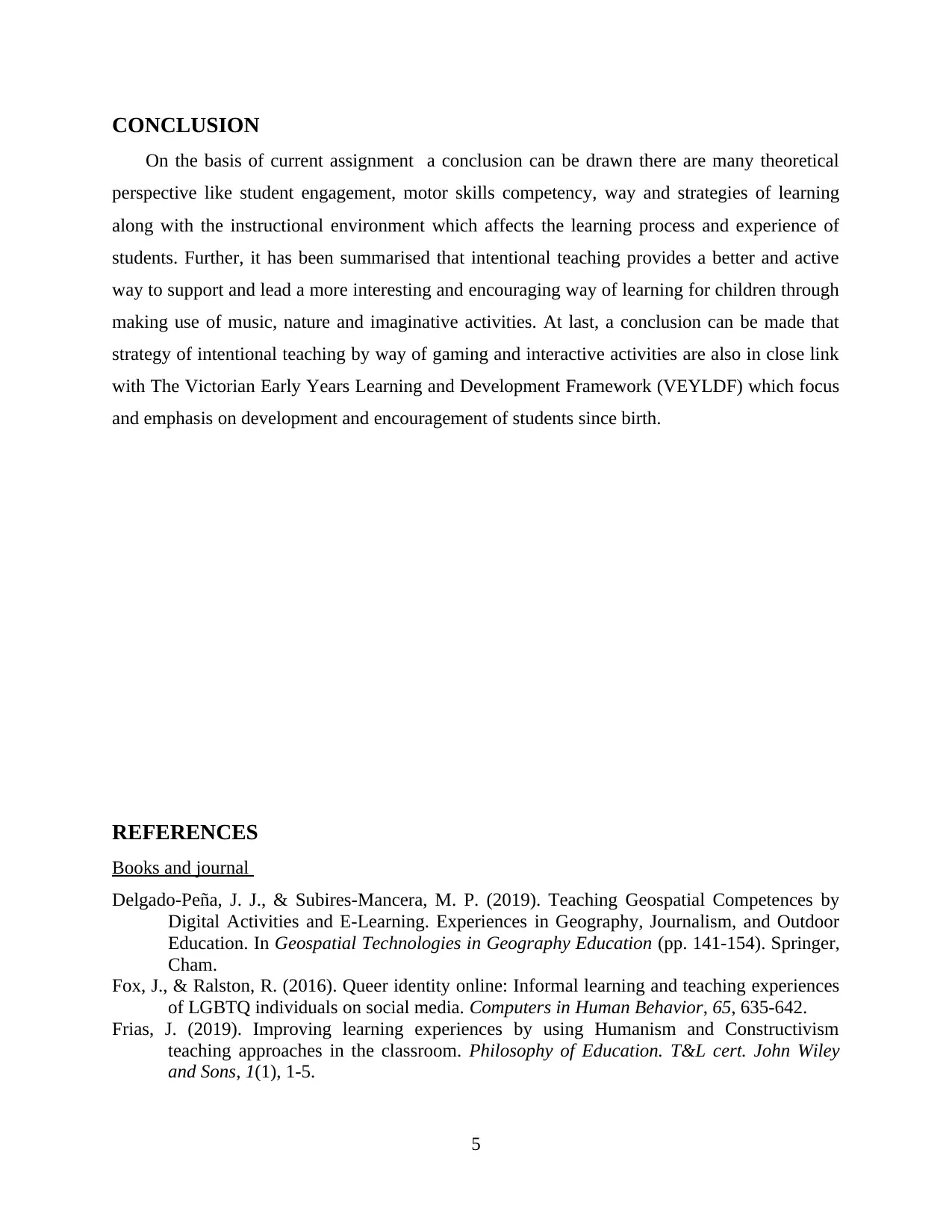
CONCLUSION
On the basis of current assignment a conclusion can be drawn there are many theoretical
perspective like student engagement, motor skills competency, way and strategies of learning
along with the instructional environment which affects the learning process and experience of
students. Further, it has been summarised that intentional teaching provides a better and active
way to support and lead a more interesting and encouraging way of learning for children through
making use of music, nature and imaginative activities. At last, a conclusion can be made that
strategy of intentional teaching by way of gaming and interactive activities are also in close link
with The Victorian Early Years Learning and Development Framework (VEYLDF) which focus
and emphasis on development and encouragement of students since birth.
REFERENCES
Books and journal
Delgado-Peña, J. J., & Subires-Mancera, M. P. (2019). Teaching Geospatial Competences by
Digital Activities and E-Learning. Experiences in Geography, Journalism, and Outdoor
Education. In Geospatial Technologies in Geography Education (pp. 141-154). Springer,
Cham.
Fox, J., & Ralston, R. (2016). Queer identity online: Informal learning and teaching experiences
of LGBTQ individuals on social media. Computers in Human Behavior, 65, 635-642.
Frias, J. (2019). Improving learning experiences by using Humanism and Constructivism
teaching approaches in the classroom. Philosophy of Education. T&L cert. John Wiley
and Sons, 1(1), 1-5.
5
On the basis of current assignment a conclusion can be drawn there are many theoretical
perspective like student engagement, motor skills competency, way and strategies of learning
along with the instructional environment which affects the learning process and experience of
students. Further, it has been summarised that intentional teaching provides a better and active
way to support and lead a more interesting and encouraging way of learning for children through
making use of music, nature and imaginative activities. At last, a conclusion can be made that
strategy of intentional teaching by way of gaming and interactive activities are also in close link
with The Victorian Early Years Learning and Development Framework (VEYLDF) which focus
and emphasis on development and encouragement of students since birth.
REFERENCES
Books and journal
Delgado-Peña, J. J., & Subires-Mancera, M. P. (2019). Teaching Geospatial Competences by
Digital Activities and E-Learning. Experiences in Geography, Journalism, and Outdoor
Education. In Geospatial Technologies in Geography Education (pp. 141-154). Springer,
Cham.
Fox, J., & Ralston, R. (2016). Queer identity online: Informal learning and teaching experiences
of LGBTQ individuals on social media. Computers in Human Behavior, 65, 635-642.
Frias, J. (2019). Improving learning experiences by using Humanism and Constructivism
teaching approaches in the classroom. Philosophy of Education. T&L cert. John Wiley
and Sons, 1(1), 1-5.
5
Paraphrase This Document
Need a fresh take? Get an instant paraphrase of this document with our AI Paraphraser
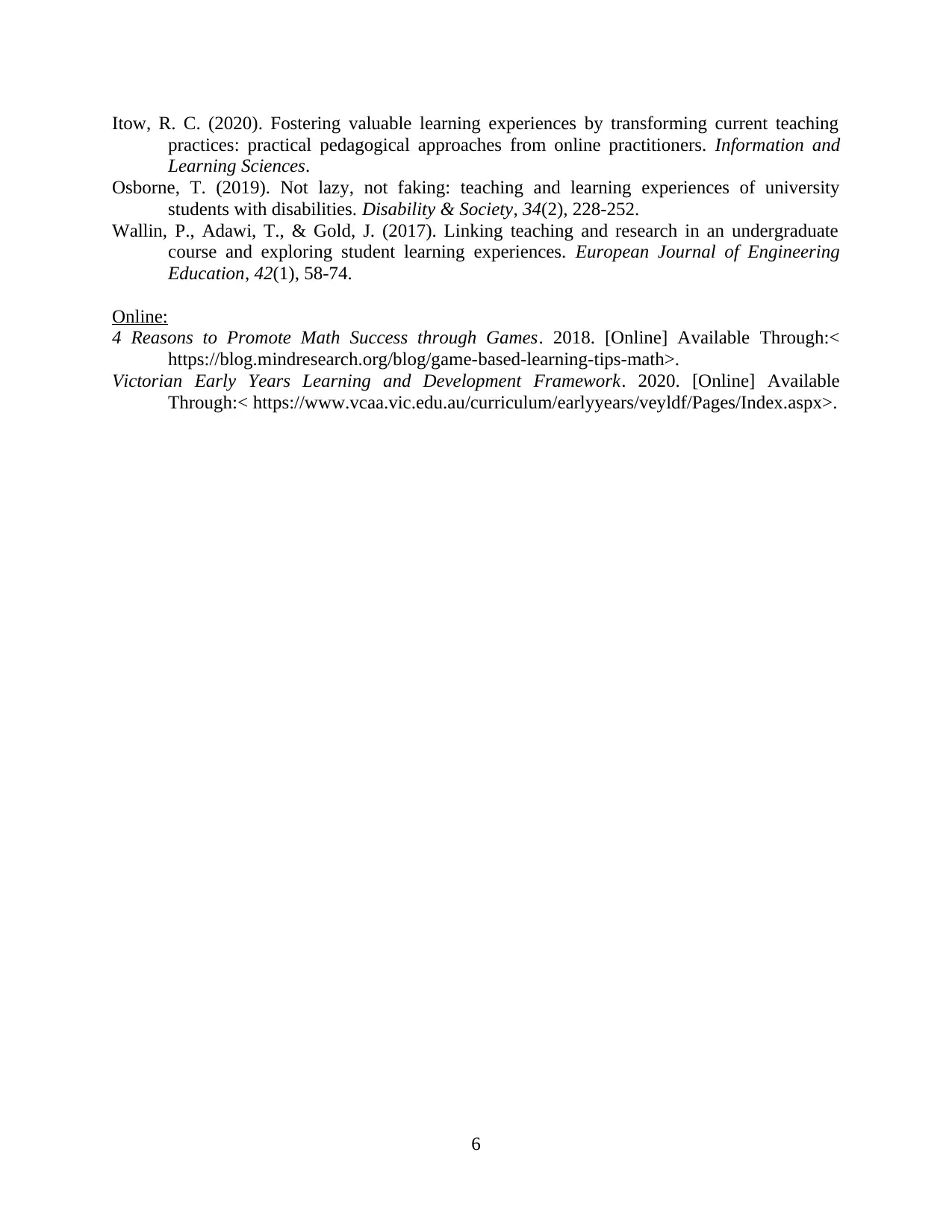
Itow, R. C. (2020). Fostering valuable learning experiences by transforming current teaching
practices: practical pedagogical approaches from online practitioners. Information and
Learning Sciences.
Osborne, T. (2019). Not lazy, not faking: teaching and learning experiences of university
students with disabilities. Disability & Society, 34(2), 228-252.
Wallin, P., Adawi, T., & Gold, J. (2017). Linking teaching and research in an undergraduate
course and exploring student learning experiences. European Journal of Engineering
Education, 42(1), 58-74.
Online:
4 Reasons to Promote Math Success through Games. 2018. [Online] Available Through:<
https://blog.mindresearch.org/blog/game-based-learning-tips-math>.
Victorian Early Years Learning and Development Framework. 2020. [Online] Available
Through:< https://www.vcaa.vic.edu.au/curriculum/earlyyears/veyldf/Pages/Index.aspx>.
6
practices: practical pedagogical approaches from online practitioners. Information and
Learning Sciences.
Osborne, T. (2019). Not lazy, not faking: teaching and learning experiences of university
students with disabilities. Disability & Society, 34(2), 228-252.
Wallin, P., Adawi, T., & Gold, J. (2017). Linking teaching and research in an undergraduate
course and exploring student learning experiences. European Journal of Engineering
Education, 42(1), 58-74.
Online:
4 Reasons to Promote Math Success through Games. 2018. [Online] Available Through:<
https://blog.mindresearch.org/blog/game-based-learning-tips-math>.
Victorian Early Years Learning and Development Framework. 2020. [Online] Available
Through:< https://www.vcaa.vic.edu.au/curriculum/earlyyears/veyldf/Pages/Index.aspx>.
6
1 out of 8
Related Documents
Your All-in-One AI-Powered Toolkit for Academic Success.
+13062052269
info@desklib.com
Available 24*7 on WhatsApp / Email
![[object Object]](/_next/static/media/star-bottom.7253800d.svg)
Unlock your academic potential
Copyright © 2020–2026 A2Z Services. All Rights Reserved. Developed and managed by ZUCOL.





